Doing well by Doing Good
The "Secret" that launched a 1000 unfulfilled dreams
From self-help to personal empowerment
So why does self-help fail so consistently? I believe that most self-help leaders are sincere individuals who genuinely want to help so I don’t think the repeat billing model is deliberate in most cases. There are other reasons including becoming discouraged by slow progress, comparing yourself to others, and setting unrealistic goals. However, my focus here is, I believe, more fundamental – a fundamental flaw in self-help is the excessive emphasis on the self in the first place, an emphasis that can descend into self-absorption and narcissism.
Byrne has recruited a veritable Who’s Who of self-help luminaries to testify about how they achieved wonderful relationships, perfect health, great wealth, palatial houses and a host of other objects of their desire through the law of attraction. To somewhat caricature the process, you can imagine manifestation as wishing for all the stuff you want in order to make you happy and then waiting for The Universe, which acts like a giant Argos store, to provide it for you – and without the need for in-store collection and self-assembly. All you need is a vision and an eternally optimistic outlook.
There are a number of flaws with this approach. Firstly more stuff, beyond a certain level does not make people proportionately happier. Instead it just fuels the ‘hedonic treadmill’ – our habit of shifting the aspirational goalposts once an object of our desires has been attained. As Shawn Achor explains in his brilliant TEDx Talk – The Happy Secret to Better Work ‘You got good grades, now you have to get better grades, you got into a good school and after you get into a better one, you got a good job, now you have to get a better job, you hit your sales target, we're going to change it.’ Bruce Springsteen succinctly summarises the ultimate futility of life on the hedonic treadmill in Badlands when he sings “Poor man wanna be rich, rich man wanna be king, And a king ain't satisfied, till he rules everything…”
Secondly, this emphasis on getting more and more stuff takes no account of the wishes of the other 7 billion plus inhabitants of our planet and even the planet itself. In the famous words of Mahatma Gandhi “The world has enough for everyone's need, but not enough for everyone's greed.” It is true that we can increase the production of goods and services and still reduce our impact on the planet by using resources more efficiently (so the proverbial cake can be expanded) but the earth’s cake is not infinitely expandable.
Thirdly, The Secret fails to emphasise that we are social creatures - life is about we as well as me; and an emphasis on the self leaves us running the risk of excluding others from our life. We know from personal experience that helping others increases our happiness much more than pursuing a life of pure selfishness.
This common sense observation that being of service enhances our quality of live is now backed up by a solid body of studies from the new science of behavioural economics which has demolished the myth, popularised by classic economists and their disciples (Margaret Thatcher springs to mind) who believe that most human interactions can be explained by ‘rational’ actions motivated by personal gain. The mantra of the bottom-liners is “everything must be paid for” and profit is their bottom line.
But with a more rounded understanding of people’s needs and motivations comes the realisation that the profit motive alone is never enough (as if it ever was). So individuals and businesses are increasingly incorporating people, purpose and planet into a quadruple bottom line. This does not diminish the importance of profit but rather it weaves it into a richer tapestry. Reluctant though I am to quote Margaret Thatcher I do agree with her assertion that the “No-one would remember the Good Samaritan if he'd only had good intentions; he had money as well.” The quadruple bottom line reflects this as people are coming to appreciating that being of service does not mean you need to be broke. The mantra of the quadruple bottom-liners is “we can do well by doing good.”
The importance of being of service has been emphasised by Tony Robins who lists contribution, along with certainty, uncertainty, significance, connection or love, and growth as the six human needs which must all be satisfied if we are to live a fulfilling life.
Here are six ways that have helped me as I seek to live a life of service.
1. Know that we are all connected in the "Great Circle of Life"
Understanding that our individual ‘selves’ are merely abstractions from an interconnected reality helps us to empathise with ‘others’ because there are, in fact, no others. This helps when it comes to giving because giving is literally ‘self-service.’ Of course you cannot make an omelette without breaking an egg so not all interactions can be mutually beneficial. However, understanding that we are connected can at the very least prompt us to ensure that we do not over-exploit the resources upon which we depend and that we use free range eggs! This spirit of enlightened exploitation was eloquently expressed by Mufasa in Disney’s Lion King in his father-son conversation with young Simba:
- Mufasa: Everything you see exists together in a delicate balance. As king, you need to understand that balance and respect all the creatures, from the crawling ant to the leaping antelope.
- Young Simba: But, Dad, don't we eat the antelope?
- Mufasa: Yes, Simba but let me explain. When we die, our bodies become the grass, and the antelope eat the grass. And so we are all connected in the great Circle of Life.
2. Develop a clear vision and mission
There are many alternative definitions of vision and mission. For me a vision is something bigger than ourselves to which we can contribute. My favourite all time ‘vision statement’ is Martin Luther King’s 1963 ‘I have a dream’ speech’ in which he outlines his vision for equal rights and justice for Americans of all colours.
King knew that he might not live to see his vision become a reality and that he alone could not make it happen but he could and did make a powerful contribution to the vision through his life and his work. This personal contribution was King’s mission.
There are many ways to develop an empowering vision and mission that will help you to use your skills and aptitudes to do good while doing well.
I have used a hybrid of several processes to develop my personal vision and mission which I regularly update in the light of experience.
This is my current vision and mission:
Vision
Project and programme planning and personal, professional and organisational development has been transformed through the use of flexible participatory approaches such as Neuro-Linguistic Programming (NLP), Outcome Mapping, and Appreciative Inquiry. People throughout the world are able to effectively plan, monitor and evaluate their efforts in a manner that reflects the complexity of the real world and respects our planetary life support systems. i.e. People can implement participatory approaches to adaptive management to achieve significant, meaningful and environmentally sustainable outcomes. The widespread adoption of organisational development approaches based on the principles of systems science and positive psychology contributes to a world in which people are happy, healthy, connected to their environment and feel increasingly abundant because they are in a position to fulfil their potential.
Misson
Which issues do you intend to tackle?
- Professional development at the organisational and individual level – this includes strategic planning, organisational effectiveness, monitoring and evaluation of projects and programmes in countries in which English and French are used as the main professional languages.
- By providing support to individuals and teams using a combination of conventional planning approaches, Appreciative Inquiry, Outcome Mapping, and NLP within a participatory framework through consultation either in person or via VoIP. I will also integrate these processes into a developmental evaluation approach to facilitate adaptive management.
- Primarily with project personnel in the international development arena but the approaches that I use are also valuable in the private sector so I envisage becoming increasingly involved in cross-sectoral work.
- Reading, taking part in refresher courses, personal EFT, journalling, maintaining my blog and website, writing an e-book on project management, professional development and my heroes. I have the time and resources to relax and socialise with my family and friends and maintain my sense of awe by as I discover new places and rediscover old places with my wife on foot and by bicycle.
3. Serve your highest good and the highest good of all/ Look for win-wins
We are used to competition in the sporting arena and for sport to be captivating there must be winners and losers. This assertion is supported by an observation that most people (particularly Americans in my experience) are perplexed by the game of cricket, in which a game can last for up to five days and still end up as a draw! Competition is also essential in life where resources are limited. However, in many cases it is possible to engineer outcomes that are mutually beneficial.
Chip and Dan Hill in their excellent book Decisive: How to make better Choices in Life and Work outline the W-R-A-P framework as a method of guarding against overconfidence and making knee-jerk reactions when making important decisions. These rapid responses can result in decisions which are motivated from the perspective of narrow self-interest. W-R-A-P is an acronym for Widen your options, Reality-test your assumptions, Attain distance before deciding and Prepare to be wrong.
Widening your options provides a rich hunting ground for win-wins. For example, instead of resigning if you are dissatisfied with your job you could examine the option of renegotiating your job description thus potentially helping yourself and your employer. Other examples of win-wins include profit sharing agreements between staff and business owners and customer loyalty bonuses.
Many win-win situations mean that no single group gets 100% of the benefits of an interaction. For example there is a trade-off (at least in the short term) between profit and donations to good causes. So in many cases we will need to compromise on our short term individual objectives, something that does not always come easy to people raised to be (narrowly) competitive.
This need to get 100% of what we want, just like the need to be right and the need for recognition, is fuelled by the ego which shouts ‘what about me’ which tends to ensure that it’s demands come to mind first when we are at the negotiating table. The Hill brothers’ advice to attain distance before deciding and to prepare to be wrong helps to provide the time, space and feedback to overcome the strident ego to improve the chances of us placing successful long term collaboration above short term gain.
4. Don’t over-promise
It is the same with training courses. Trainees invariably finish the course ready and eager to apply their new knowledge and skills to transform their lives and those around them. But upon re-entry our would-be World Changers are often faced with a less than enthusiastic reception from those back in mission control – the house needs cleaning, the kids need looking after and those deadlines are now even more urgent than they were when you left the everyday world behind.
Simple stated, we cannot control all aspects of the environment in which our project operates nor what trainees actually do once the training course has been completed. So rather than promise the earth we can emphasise possibilities, and the fact that the project or training is only one among many factors that contribute to an outcome. This kind of bounded optimism – getting to maybe rather than getting to yes – is unlikely to resonate with those self-help gurus who ask us to eliminate words like “failure”, “doubt” and “impossible” from our vocabularies. But a diverse lexicon that permits different words in different contexts sits comfortably with somebody like me who recoils from fist-pumping, stage pyrotechnics and living my life to the accompaniment of anthemic rock music.
5. Find roles model or heroes
Some of my heroes who exemplify being of service are Franklin D. Roosevelt for his practical concern for the poor, Wangari Maathai the Kenyan environmental activist for her courage to confront authority, Dame Cecily the founder of the hospice movement who valued the dignity of all lives and Viktor Frankl a Nazi concentration camp survivor and author of Man’s Search for Meaning who emphasised giving to others as a means of transcending our day-to-day concerns. Having such role models allows me to ask the questions about what would Franklin, Maathai, Cecily or Frankl have done or advised me to do when faced with daily situations. For me it provides a valuable tool to tap into the collective psyche.
My heroes list currently stands at 111. It is steadily increasing although there is the occasional deletion. Lance Armstrong fell off the list a few years back, not because he no longer embodied certain heroic qualities but because it is hard for me to focus on these qualities in view of his years of lying and cheating. Perhaps I can ‘reinstate’ him once my abilities to forgive have matured.
6. Do something today – it will give you momentum
Small acts of kindness can be incorporated into your daily life without too much difficulty. Thanking people for their help is about as simple as it gets but this small gesture can help brighten up people’s day. Little complements cost nothing but can touch people’s hearts. We are often quick to criticise but we sometimes forget to praise.
I spend a lot of time in airports and have recently adopted a systematic approach to helping those weaker than myself take their luggage off the airport baggage carousel (I do give their luggage back to them by the way!!). It is a small helpful gesture that gives me a lot of pleasure and costs me absolutely nothing.
Whether it is being of service or any other sphere of life, you can’t steer a parked car. So get in gear, release the handbrake and get going.
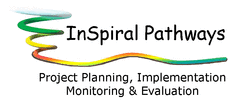
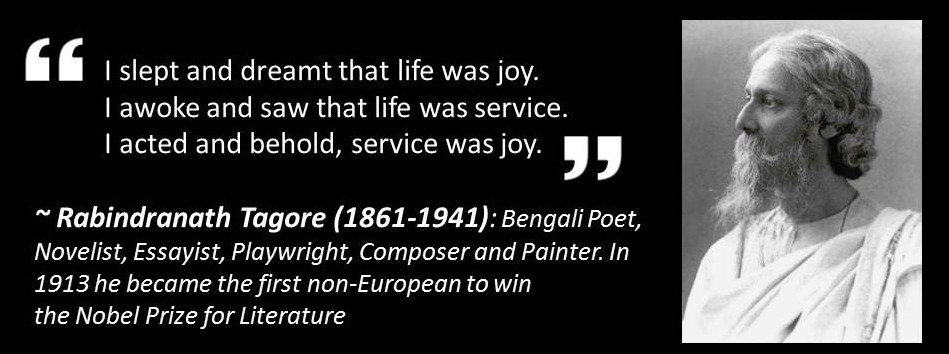
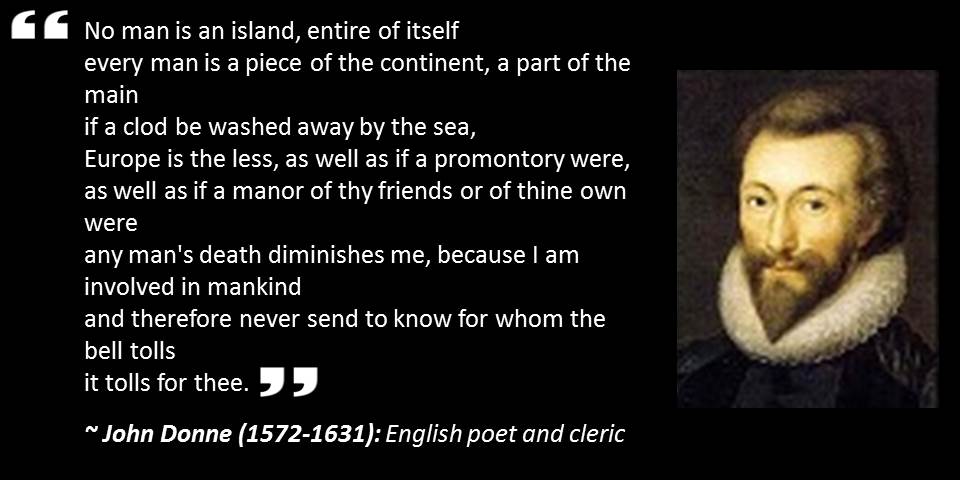
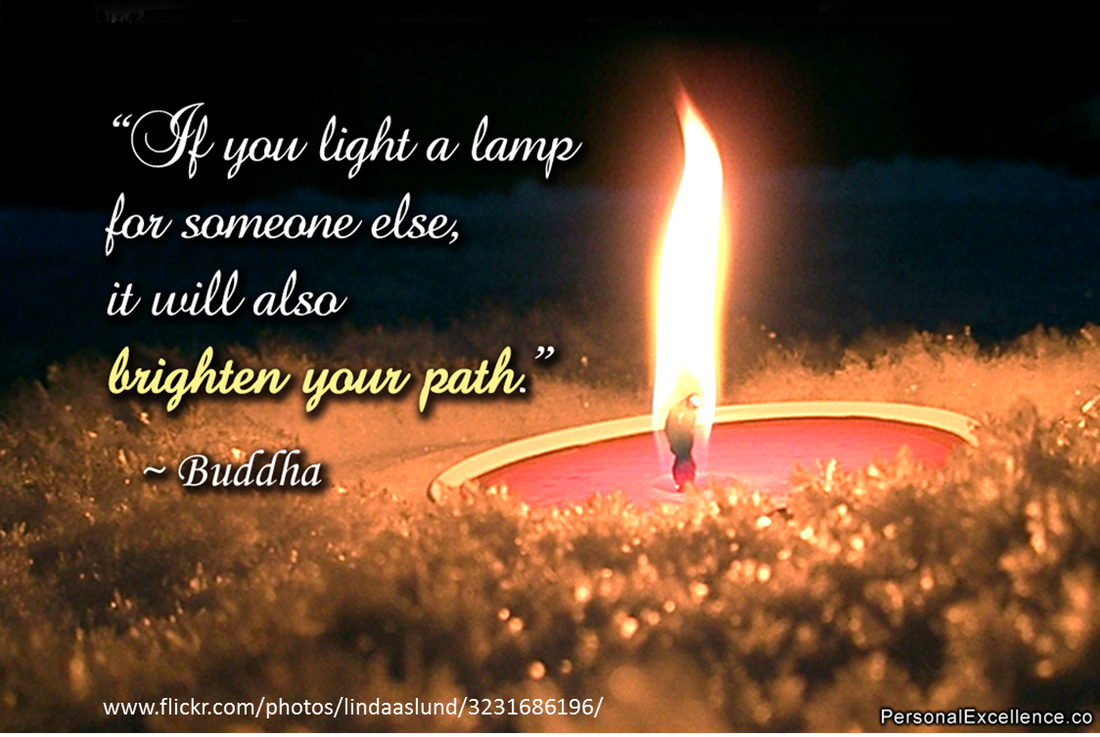
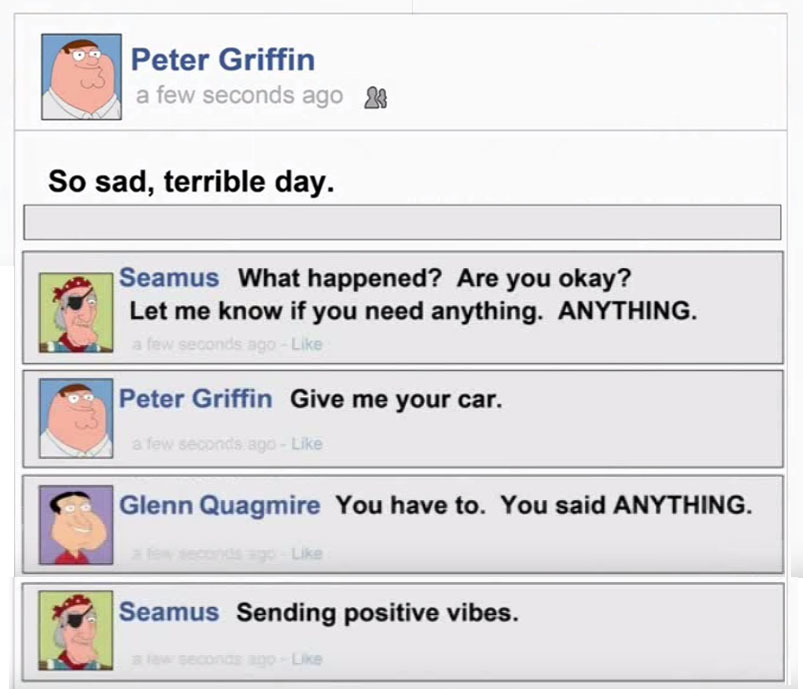
 RSS Feed
RSS Feed
